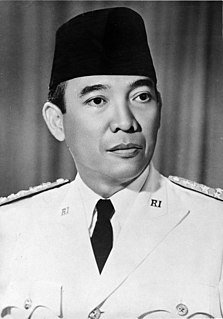 W
WSukarno was an Indonesian politician who was the first president of Indonesia, serving from 1945 to 1967.
 W
WConstitutional Assembly elections were held in Indonesia on 15 December 1955. The Indonesian Provisional Constitution of 1950 had provided for the establishment of a democratically elected Constitutional Assembly to draw up a permanent constitution. In April 1953 the legislature passed the election bill. The elections for the People's Representative Council were set for September 1955, with the Constitutional Assembly elections three months later.
 W
WLegislative elections were held in Indonesia on 29 September 1955, the first since independence. Candidates ran to be elected to the 257-seat People's Representative Council, which would replace the existing provisional legislature. Despite hopes that the elections would bring about political stability, the legislature elected only lasted four years before being dissolved by presidential decree.
 W
WRuslan Abdulgani was an Indonesian government official and diplomat known for his role as a leader during the Indonesian National Revolution in the late 1940s, and as a key minister and United Nations ambassador in the Sukarno government during the 1950s and 1960s.
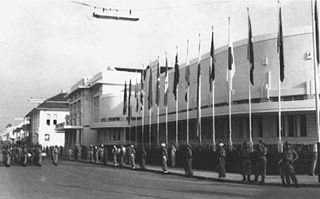 W
WThe first large-scale Asian–African or Afro–Asian Conference—also known as the Bandung Conference —was a meeting of Asian and African states, most of which were newly independent, which took place on 18–24 April 1955 in Bandung, Indonesia. The twenty-nine countries that participated represented a total population of 1.5 billion people, 54% of the world's population. The conference was organized by Indonesia, Burma (Myanmar), Pakistan, Ceylon, and India and was coordinated by Ruslan Abdulgani, secretary general of the Ministry of Foreign Affairs of the Republic of Indonesia.
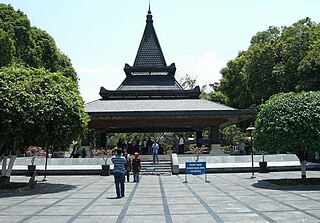 W
WBlitar is a city in East Java, Indonesia, about 73 km from Malang and 167 km from Surabaya. The area lies within longitude 111° 40' – 112° 09' East and its latitude is 8° 06' South. The city of Blitar lies at an altitude on average 167 metres above sea level.
 W
WThe Communist insurgency in Sarawak occurred in Malaysia from 1962 to 1990, and involved the North Kalimantan Communist Party and the Malaysian Government. It was one of the two Communist insurgencies to challenge the former British colony of Malaysia during the Cold War. As with the earlier Malayan Emergency (1948–1960), the Sarawak Communist insurgents were predominantly ethnic Chinese, who opposed to British rule over Sarawak and later opposed the merger of the state into the newly created Federation of Malaysia. The insurgency was triggered by the 1962 Brunei Revolt, which had been instigated by the left-wing Brunei People's Party in opposition to the proposed formation of Malaysia.
 W
WThe 1945 State Constitution of the Republic of Indonesia is the basis for all laws of Indonesia.
 W
WThe Constitutional Assembly was a body elected in 1955 to draw up a permanent constitution for the Republic of Indonesia. It sat between 10 November 1956 and 2 July 1959. It was dissolved by then President Sukarno in a decree issued on 5 July 1959 which reimposed the 1945 Constitution.
 W
WDe-Sukarnoization, also spelled de-Soekarnoization, is a policy from the transition to the New Order with which Suharto intended to defame Indonesia's first president, Sukarno, and lessen his presence in Indonesian history.
 W
WFatmawati is a National Hero of Indonesia. As the inaugural First Lady of Indonesia, she was the third wife of the first president of Indonesia, Sukarno, and the mother of Indonesia's first female president, Megawati Sukarnoputri. She constructed the first flag flown by Indonesia.
 W
WThe Grave of Sukarno is the grave of Sukarno, Indonesia's first president, in Blitar, East Java. Initially an ordinary grave where he was buried shortly after his death, a mausoleum was constructed in the late 1970s and the site evolved into a political and religious pilgrimage site, receiving hundreds of thousands of visitors annually.
 W
WMohammad Hatta was an Indonesian politician who served as the country's first vice president. Known as "The Proclamator", he and a number of Indonesians, including the first president of Indonesia, Sukarno, fought for the independence of Indonesia from the Dutch. Hatta was born in Fort de Kock, Dutch East Indies. After his early education, he studied in Dutch schools in the Dutch East Indies and studied in the Netherlands from 1921 until 1932.
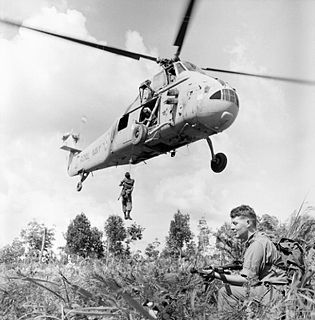 W
WThe Indonesia–Malaysia confrontation or Borneo confrontation was a violent conflict from 1963–66 that stemmed from Indonesia's opposition to the creation of Malaysia. The creation of Malaysia was the amalgamation of the Federation of Malaya, Singapore and the crown colony/British protectorates of North Borneo and Sarawak in September 1963. Vital precursors to the conflict included Indonesia's policy of confrontation against Netherlands New Guinea from March–August 1962 and the Brunei Revolt in December 1962.
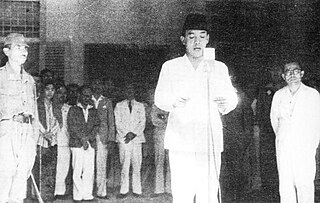 W
WThe Proclamation of Indonesian Independence was read at 10:00 in the morning of Friday, 17 August 1945. The declaration marked the start of the diplomatic and armed resistance of the Indonesian National Revolution, fighting against the forces of the Netherlands and pro-Dutch civilians, until the latter officially acknowledged Indonesia's independence in 1949. The document was signed by Sukarno and Mohammad Hatta, who were appointed president and vice-president respectively the following day.
 W
WDiah Permata Megawati Setiawati Sukarnoputri is an Indonesian politician who served as the fifth president of Indonesia from 2001 to 2004. She previously served as the eighth vice president from 1999 to 2001.
 W
WSjafruddin Prawiranegara,, was an Indonesian politician, economist, and latterly Islamic philosopher. An early member of the KNIP, he briefly served as the head of government during the Indonesian Revolution when fellow revolutionaries Sukarno and Hatta were captured.
 W
WThe Presidential Decree of July 5, 1959 (legally the Decree of the President of the Republic of Indonesia Number 150 of 1959 on the Return to the Constitution of 1945 was issued by President Sukarno in the face of the inability of the Constitutional Assembly of Indonesia to achieve the two-thirds majority to reimpose the 1945 Constitution. It was army chief of staff Abdul Haris Nasution who concluded that this would be the only way to bring about the reintroduction of a constitution that paved the way for the military to play a greater role in the running of the state, ushering in the period known as the "guided democracy".
 W
WPrijono was an Indonesian politician and academic. Prijono was a leading figure of the Murba Party and the Indonesian Peace Committee. Prijono served as Minister of Education and Culture between 1957 and 1966. He was one of the intellectual ideologues who surrounded President Sukarno.
 W
WChairul Saleh Dt Paduko Rajo was born in Sawahlunto, West Sumatra. He was an Indonesian government minister and vice prime minister during the Sukarno presidency. He was a close confidant of Sukarno, whom he had helped persuade to declare Indonesian independence in 1945. He lived in the Netherlands from 1952–1953, but returned to Indonesia after being expelled. He joined Sukarno’s circle of advisers in 1955.
 W
WSoekarno is a 2013 Indonesian biographical film directed by Hanung Bramantyo and written by Ben Sihombing. This film tells the story of the life of the late Sukarno, the first president of Indonesia. Sukarno, who was born with the name "Kusno", was one of the major figures who played an important part in the fight for Indonesia's independence from Dutch colonial rule. This film stars Ario Bayu as Sukarno.
 W
WMuhammad Guruh Irianto Sukarnoputra is a member of Indonesia's People's Representative Council and an artist. He is the youngest son of Indonesia's first president, Sukarno with his third wife, Fatmawati, and the brother to the former Indonesian President, Megawati.
 W
WThe Tjakrabirawa Regiment was the presidential bodyguard unit of former Indonesian President Sukarno. The group was disbanded in 1966 during the upheavals of the transition to the New Order.